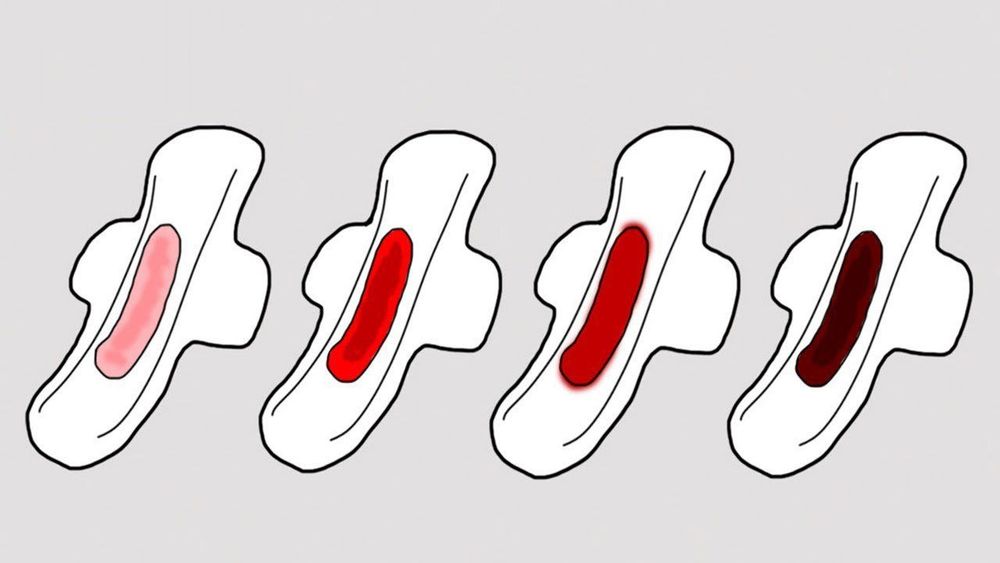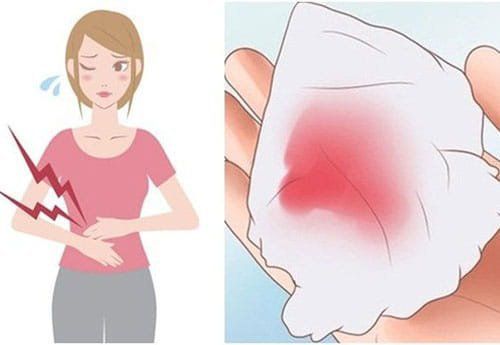This is an automatically translated article.
The article was professionally consulted by Specialist Doctor I Pham Thi Yen - Department of Obstetrics and Gynecology - Vinmec Hai Phong International General Hospital.Irregular menstruation causes many troubles and worries for women in daily life. In addition, it also reflects the health status and motherhood of women. Therefore, women need to understand the abnormal symptoms of menstruation to have a reasonable treatment method for themselves.
1. What is irregular menstruation?
Menstruation is bleeding from the uterus to the vagina due to the shedding of the lining of the uterus when conception has not occurred.Menstrual irregularities - or menstrual disorders - are menstrual irregularities related to the menstrual cycle or some accompanying symptoms during menstrual days such as: irregular periods (menorrhagia) , oligomenorrhea, amenorrhea), frequency and amount of blood loss during menstruation (hypermenorrhea) accompanied by abnormalities such as change in menstrual blood color, dysmenorrhea (severe abdominal pain during menstruation)...
These are signs or symptoms of one or more different diseases. This phenomenon is not serious on the surface but affects the fertility of women.
Because of lack of knowledge and subjectivity, many people believe that irregular periods are caused by changes in weather, diet, rest... therefore, they unwittingly create conditions for pathogens to live long in the body. and cause serious complications.

2. Manifestations of menstrual disorders
2.1 Amenorrhea What is amenorrhea? Amenorrhea is a phenomenon that occurs due to abnormalities in genital development such as partial or complete failure of genital development. If the genitals are not fully developed, such as without a uterus or ovaries, there will be no menstrual period. If menstruation is delayed after 16 years, it is caused by delayed puberty, underdeveloped ovaries, or delayed development, due to poor nutrition, small person, thin body, or illness, so the body is underdeveloped. develop. Amenorrhea after 18 years of age is called primary amenorrhea. The spontaneous cessation of menstruation for about three to six months is called secondary amenorrhea.2.2 What is the end of the menstrual cycle? In case of monthly menstrual blood is still excreted but due to anatomical obstacles that prevent menstrual blood from coming out, it is called amenorrhea. It can be encountered in the following cases:
Abortion due to non-perforated hymen: are cases where the genitals develop normally but because the hymen is thick and not perforated, the menstrual blood cannot escape. Absence of menstruation due to a septum: In the vagina, there is a transverse septum or the vagina does not develop in the lower part, so the menstrual blood cannot flow out. Absence of menstruation due to no vagina: because the genitals only have the uterus and ovaries, there is no vagina, so the menstrual blood is trapped in the uterus and overflows into the fallopian tubes. Absence of menstruation causes monthly lower abdominal pain, each pain lasts for 3-4 days, then returns to normal. The pain after the pain will increase more than the previous pain, five or six times such pain will see a mass above the pubic bone, sometimes the pain is tight and writhing. In the case of amenorrhea due to the hymen not being perforated, it will feel heavy and tight in the vulva. When the baby's lips are drawn in the vulva, the menstrual blood will stretch and stretch the hymen and have a purple color. Menstrual blood cannot escape, stagnation will cause the uterus to swell, then overflow into the fallopian tubes, causing the uterus and fallopian tubes to stretch, destroying the uterine lining and fallopian tubes, causing infertility. Stagnant blood creates a favorable environment for bacteria to grow, which can infect and then rupture and cause abdominal inflammation.
2.3 Menorrhagia, heavy bleeding

What is menorrhagia? Menstrual cycle lasts more than 1 week, menstrual blood does not clot, heavy bleeding in the middle of menstruation is called menorrhagia. Menorrhagia – bleeding that lasts more than 15 days or persistent (non-menstrual) genital bleeding.
Caused by high levels of estrogen but no ovulation. Progesterone secretion is out of proportion to estrogen. The endometrium thickens forever, but the blood vessels do not grow in time, there is not enough blood to nourish, necrosis, shedding small patches, causing long-term bleeding called menorrhagia due to hormones.
Menorrhagia, heavy bleeding may be accompanied by lower abdominal pain, fatigue, dizziness, dizziness due to blood loss. In addition, some cases of fever, vaginal discharge in genital infections, nosebleeds, bleeding gums... are at risk of causing infertility
2.4 Dysmenorrhea What is Dysmenorrhea? Dysmenorrhoea is a symptom of cramping pain in the lower abdomen (sometimes also accompanied by back pain, headache, diarrhea) during menstruation, in addition to back pain, accompanied by chest tightness, breast tenderness, nausea, easy feeling motion. This can happen a few days before, during, or after your period.
The cause of this phenomenon is that during the menstrual cycle, the uterine lining secretes a lot of prostaglandins (from the proliferative phase to the secretory phase at the end of the menstrual cycle) which increases even more during menstruation, especially during menstruation. in the first two days. This is called primary dysmenorrhea. There are also cases of micronutrient deficiency (calcium deficiency) or other medical conditions, called secondary dysmenorrhea.
To overcome this situation, it is possible to use the female sex hormone progesterone, estrogen makes the growth of the uterine lining worse, inhibits the synthesis of prostaglandins leading to pain relief. Birth control pills containing these two hormones can be used and taken 2-3 days before menstruation or immediately after seeing the first drop of period. In addition, you can use antispasmodic analgesics, non-steroidal anti-inflammatory drugs (drugs that inhibit the production of prostaglandins) to relieve pain.
2.5 Hypochromic Anemia What is Hypochromic Anemia? The state of blood loss, iron loss at the time of a normal menstrual cycle is called hypochromic anemia. Therefore, it is necessary to add foods rich in iron and easily absorbed. When you want to use iron-containing drugs, it is best to use iron tablets in combination with folic acid (because folic acid is also essential for the development of children at this stage).

Amenorrhea is a condition in which the amount of menstrual bleeding is low and lasts for a short time (from two days or less). Symptoms can occur due to diseases in the uterus such as a baby uterus, adhesions to the uterus after abortion, postpartum... Ovarian diseases such as premature ovarian failure, ovarian cancer... also cause this phenomenon.
2.7 Irregular Menstruation Irregular Menstruation is a condition in which a menstrual cycle lasts longer than 35 days, even several months (normal menstrual cycle ranges from 21 to 35 days). The opposite of a light period is a quick menstrual cycle with a menstrual cycle of only 21 days or less.
Irregular periods are caused by abnormalities in the hypothalamus and pituitary glands in the brain, as these are the hormones that govern the secretion of oestrogen and progesterone by the ovaries. They cause the lining of the uterus to change to produce menstruation or to receive a fertilized egg to implant and develop into a fetus. Menstruation is also due to less ovulation, delayed oocyte development, so it prolongs the mature oocyte phase. Some people have an ovulatory cycle that lasts more than 40 days to three months, even though the amount of blood and menstrual period are still normal.
Besides, polycystic ovary syndrome can also lead to sparse menstruation. This is a condition in which the ovaries have many growing follicles, but none of them mature and often do not ovulate (no egg is released). If left untreated, polycystic ovaries can lead to infertility.
Irregular periods, although not dangerous to health, can affect the ability to have children, because less ovulation should reduce the pregnancy rate, so it is necessary to go to the hospital to check as soon as possible
To regulate menstruation When menstruation returns to normal, women need to build a healthy lifestyle and proper nutrition. In the case of prolonged menstrual disorders, it is advisable to seek out reputable facilities to check for abnormal signs.
Vinmec International General Hospital is proud to be the leading unit in the examination and screening of gynecological diseases, currently has a basic gynecological examination and screening package, with outstanding advantages such as: :
Medical team - doctors are leading experts, highly qualified, dedicated and wholeheartedly for the benefit of patients Comprehensive and professional medical examination, consultation and treatment service Equipment system Modern equipment, effective diagnosis and treatment, modern, civilized, luxurious and sterile medical space Fully guaranteeing the safety and privacy of customers. Modern, efficient and effective model for managing, sharing and connecting information online.
Please dial HOTLINE for more information or register for an appointment HERE. Download MyVinmec app to make appointments faster and to manage your bookings easily.














